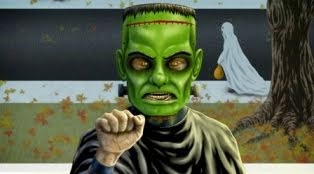Friday, March 3, 2017
BLAXPLOITATION MONTH: Super Fly (1972)
The first blaxploitation movie I ever heard of was “Shaft.” The second blaxploitation movie I ever heard of was “Super Fly.” That the two films are forever linked in my mind is appropriate. “Super Fly” was directed by Gordon Parks Jr., the son of the director of “Shaft!” It's easy to see how this film – with its black hero, funk soundtrack, and inner city setting – was hoping to capitalize on the prior year's success of “Shaft.” Despite their similarities, “Super Fly” tells a very different story to Parks Sr.'s groundbreaking detective story. With more of a focus on life on the street and a drug dealing anti-hero, it would attract controversy from people who were concerned it glorified selling and using drugs. Now, it's regarded as an influence on hip-hop and R&B style.
The preposterously named Youngblood Priest is a cocaine dealer living and working in Harlem. Despite the lavish life style his drug business affords him, Priest desires to leave the drug business. Before retiring, he hopes to sell enough product to live comfortably. His exit is hampered by several forces. His mentor and supplier do not want him to leave the business. A close friend is concerned about whether Youngblood can survive outside the criminal world. Mostly, a group of corrupt cops conspire to keep Priest from putting his coke selling ways behind him. He has to be clever if he's going to survive.
Comparisons to “Shaft” do “Super Fly” no favors. Gordon Parks Jr. was not as competent a filmmaker as his father. Several scenes in “Super Fly” are shot in a very rough fashion. There's a few moments involving handheld camera work that is shaky, to say the least. While the scenes of John Shaft walking around New York added to that movie's sense of place, similar scenes of Youngblood Priest going around the city seemingly just pad out “Super Fly's” run time. A few of Parks' stylistic flourishes are interesting. One montage is composed entirely of still photographs, arranged on-screen in interesting ways. Other sequences are less compelling. A love scene stretches on and on, the camera lingering on an actress' butt as she writhes in a bath.
Youngblood Priest is an intentional anti-hero. He's not a very good person. Aside from selling drugs – you know, profiting off the misery of addicts – he is very rough with the people he considers his friends. He's ruthless to his employees. He's callous towards women, using them just for sex. Yet Priest is aware that his life style is destructive. That's why he wants to get out. You can tell he internally struggles with his decision, wondering if getting out is worth the trouble. Ron O'Neil, a classically trained stage actor, brings that level of thought and consideration to the part. (In another connection to “Shaft,” Ron O'Neil auditioned for the title part but was reportedly turned away because he was too light-skinned.)
Keeping with that approach, “Super Fly” is more of a low key character study then an action flick. Yes, there are bursts of excitement. Early on, Youngblood is attacked and robbed by a junkie, leading to an extended foot chase. The film concludes with Priest using judo flips to best the corrupt cops, which the film shooting in slow motion. But don't expect shootouts and car chases. “Super Fly” is almost leisurely paced, frequently focusing on the daily routines of its characters. There are many scenes devoted to the everyday reality of selling drugs. Intense conversations between friends and enemies are shot in close-ups. The film was obviously indebted to “Shaft” but “Super Fly” is trying something different, pulpy but still based in reality.
A well known factoid concerning “Super Fly” is that the movie was out-grossed by its own soundtrack. “Super Fly: The Movie” is a mildly well regarded cult flick. “Super Fly: The Album” is widely considered one of the best funk/soul records ever. Curtis Mayfield's original songs are classics that linger in your mind for their catchiness and their socially relevant lyrics. Mayfield's airy but determined vocals are backed up by amazingly funky instrumentation. There are so many great songs in the film that it's hard to pick just one as a favorite. The titular theme song is driving and powerful. “Pusher Man” is an undeniably smooth, brilliantly written classic. “Freddie's Dead,” the full version of which never play in the film, is a mournful but propulsive song that sums up the film's divided themes better then the actual movie does. (Controversial opinion incoming: I do like Fishbone's cover slightly better then the original.)
In response to the movie's controversial reception, O'Neil claimed “Super Fly” was an anti-drug movie. This doesn't really hold out. Youngblood casually uses drugs without consequences and the effects of addiction are barely featured. His lifestyle is presented as glamorous and enviable, the film undeniably glorifying the drug dealing business. Despite the controversy, “Super Fly” would become a success, spawning an immediate sequel the next year and a legacy sequel eighteen years later. (“Superfly T.N.T.,” by the way, has never been released on DVD and isn't even on Youtube, so I don't know when I'll cover it.) Though forever in “Shaft's” shadow, the film retains a cult following to this day for its music and fashion sense. [7/10]
[THE BLAXPLOITATION CHECKLIST: 10 outta 12]
[X] Afros or Sideburns
[X] Brothels or Pimps
[] Churches or Pastors
[X] Funky Soundtrack
[] Homophobic Caricatures
[X] Inner-City Setting
[X] Night Club Act
[X] Plot Involving Drugs or Organized Crime
[X] Racist Authority Figures
[X] Sticking It to the Man
[X] Sweet Love Makin'
[X] Use of Street Slang
Subscribe to:
Post Comments (Atom)







No comments:
Post a Comment